Renters in Vancouver face Canada's tightest, most expensive market: CMHC
 Homes are pictured in Vancouver, Tuesday, Apr. 16, 2019. THE CANADIAN PRESS/Jonathan Hayward
Homes are pictured in Vancouver, Tuesday, Apr. 16, 2019. THE CANADIAN PRESS/Jonathan Hayward
Renters in Vancouver pay the highest prices and face the lowest vacancy rates in the country, according to the Canada Mortgage and Housing Corporation.
The federal agency released its annual Rental Market Report Wednesday. The average rent for a two-bedroom purpose-built rental in the city increased 8.6 per cent in 2023 to $2,181. The vacancy rate remained unchanged from 2022 at 0.9 per cent.
The data includes what long-term renters are paying for their units as well as what new renters are being charged – which is why the figure may seem relatively low when compared with advertised prices. For one example, a report from rentals.ca said the average price for a two-bedroom in December of 2023 was $3,660.
While the province caps annual increases for renters who stay in their homes, there is no such limit for a unit when it turns over to a new tenant.
"Renters face large rent premiums if they move," the report says.
In fact, the overall increase in the average rent "was driven by large increases in rents of units at turnover" and "the average rent for units that turned over were 26.6 per cent higher than units that didn’t turn over," according to CMHC.
Advocates for renters and affordable housing have tried to push the province to bring in vacancy control, which would cap the amount rent can rise between tenants in order to address these spikes.
While the market as a whole remains "strained," the report points out that "affordability worsened for low-income households: vacancy rates for the most affordable units were lower than average," according to CMHC, which noted that the vacancy rate for the cheapest 25 per cent of apartments was 0.6 per cent.
"As rental demand continues to increase, renters with lower incomes will face greater pressure as rents outpace their wage growth," the report said.
In 2023, a minimum-wage worker renting the average bachelor unit, the report says, would have spent more than 50 per cent of their income on rent.
"Those entering the market or moving may see more challenges as asking rents are typically above the current average. Lower-income renters are also more likely to seek more affordable but smaller units or shared living arrangements that will fit their budget but that may not meet their housing needs," the report said.
There were 3,144 new, purpose-built units that came on the market last year – higher than the five-year-average but not enough to drive down prices or increase the vacancy rate.
"Rental demand was driven by record immigration and decreases in homeownership affordability," the report says, noting this trend was observed nation-wide – particularly in urban centres.
Nationally, the vacancy rate of 1.5 per cent was the lowest ever recorded by the agency and the average rent rose by eight per cent to $1,359 as "supply was unable to keep pace with demand."
The full report is available online.
CTVNews.ca Top Stories

'Mayday! Mayday! Mayday!': Details emerge in Boeing 737 incident at Montreal airport
New details suggest that there were communication issues between the pilots of a charter flight and the control tower at Montreal's Mirabel airport when a Boeing 737 made an emergency landing on Wednesday.
Trudeau appears unwilling to expand proposed rebate, despite pressure to include seniors
Prime Minister Justin Trudeau does not appear willing to budge on his plan to send a $250 rebate to 'hardworking Canadians,' despite pressure from the opposition to give the money to seniors and people who are not able to work.
Hit man offered $100,000 to kill Montreal crime reporter covering his trial
Political leaders and press freedom groups on Friday were left shell-shocked after Montreal news outlet La Presse revealed that a hit man had offered $100,000 to have one of its crime reporters assassinated.
Cucumbers sold in Ontario, other provinces recalled over possible salmonella contamination
A U.S. company is recalling cucumbers sold in Ontario and other Canadian provinces due to possible salmonella contamination.
Trudeau says no question incoming U.S. president Trump is serious on tariff threat
Prime Minister Justin Trudeau says incoming U.S. president Donald Trump's threats on tariffs should be taken seriously.
In a shock offensive, insurgents breach Syria's largest city for the first time since 2016
Insurgents breached Syria's largest city Friday and clashed with government forces for the first time since 2016, according to a war monitor and fighters, in a surprise attack that sent residents fleeing and added fresh uncertainty to a region reeling from multiple wars.
Canada Bread owner sues Maple Leaf over alleged bread price-fixing
Canada Bread owner Grupo Bimbo is suing Maple Leaf Foods for more than $2 billion, saying it lied about the company's involvement in an alleged bread price-fixing conspiracy.
Musk joins Trump and family for Thanksgiving at Mar-a-Lago
Elon Musk had a seat at the family table for Thanksgiving dinner at Mar-a-Lago, joining President-elect Donald Trump, Melania Trump and their 18-year-old son.
Here's how thick ice needs to be to park a truck on it, according to Sask. Water Security Agency
The Saskatchewan Water Security Agency (WSA) says ice should be at least one foot (30 centimetres) thick before it's safe to drive a car or light truck on a frozen body of water.
































